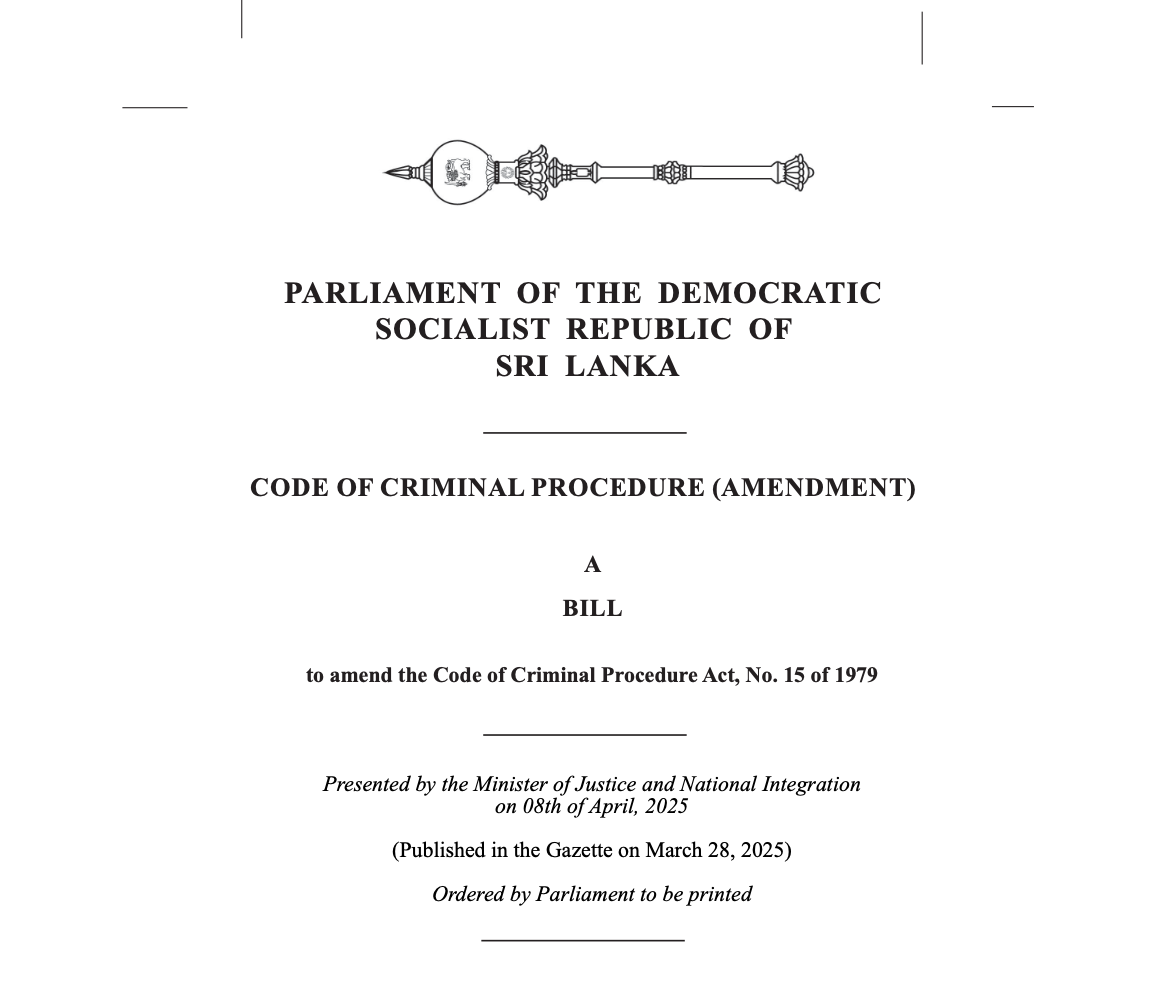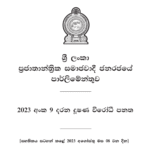Overview: The “Code of Criminal Procedure (Amendment) Bill – 2025” introduced by the Minister of Justice and National Integration seeks to modernize and streamline criminal procedures in Sri Lanka. It primarily introduces mechanisms for remote participation in court proceedings and clarifies the circumstances under which a suspect’s or accused’s physical presence in court may be dispensed with.
Key Amendments:
- Dispensing with Personal Attendance (Sections 144A, 144B, 241A, 241B):
- Magistrates and High Court Judges are empowered to excuse the physical presence of a suspect/accused in court under specific circumstances (e.g., threat to life, public unrest, pandemics, quarantine, or rehabilitation).
- Attendance must not be excused in cases involving first-time court appearances from custody, allegations of torture or human rights violations, or if the accused is of unsound mind or does not consent to representation by an Attorney-at-Law.
- When excused, representation via audio-visual linkage must be arranged, and judicial officers are required to monitor the well-being of the detained suspect/accused through timely visits.
- Remote Testimony (Sections 273A–273U):
- Witnesses may provide testimony remotely via contemporaneous audio-visual linkage, including from outside Sri Lanka.
- Detailed procedures for appointment of commissioners, court officers, and interpreters are included.
- Protocols ensure identity verification, document handling, safeguarding against tampering or coaching, and technology failure contingencies.
- Special attention is given to expert witnesses, including medical officers and forensic experts, who may submit signed reports electronically.
- Recording and admissibility of such evidence is subject to safeguards and requires proper documentation.
- Technical and Procedural Regulations:
- Introduction of new Forms 24 and 25 for communications with diplomatic officers and affirmations by commissioners.
- Provision for the creation of technology-enabled courtrooms and regulations on equipment, costs, and procedural standards, with the Chief Justice’s concurrence.
- Safeguards and Oversight:
- Judicial oversight is central, with detailed accountability mechanisms such as recording of reasons, rights to representation, and in-person verification of detainee well-being.
- Prohibitions against unauthorized recordings and mechanisms to respond to technological disruptionsduring proceedings are included.
- Courts may allocate costs, unless technology is state-provided or unless ordered otherwise in the interest of justice.
Implications:
- Efficiency & Accessibility: The Bill enhances procedural efficiency and aligns with global practices by integrating digital testimony and reducing unnecessary logistical burdens.
- Rights Protection: It preserves core rights of suspects and accused through clear limitations and consent-based provisions.
- Judicial Workload Management: Empowers courts to handle cases flexibly, especially during emergencies or when dealing with high-risk detainees.
- Technological Advancement: Encourages modernization of court infrastructure and formal recognition of digital evidence procedures.
Constitutional Assessment:
a. Sovereignty and Separation of Powers (Articles 3 and 4)
- The bill maintains judicial discretion, thus preserving the exercise of judicial power under Article 4(c).
- There is no encroachment by the legislature or executive on judicial powers, satisfying the doctrine of separation of powers.
b. Right to a Fair Trial (Article 13(3))
- The right to be heard in person or through an Attorney-at-Law is explicitly preserved.
- The inclusion of audio-visual representation aligns with modern procedural norms and does not violate due process, provided that facilities for private legal consultation are ensured (as required by the bill and Article 13(3)).
c. Freedom from Arbitrary Detention and Access to Courts (Articles 13(1), 13(2), and 13(4))
- The amendments retain judicial oversight over detention and mandate timely review by a judicial officer.
- Provisions requiring the Magistrate to visit the detention location serve to prevent abuse of process or incommunicado detention, thereby respecting constitutional safeguards.
d. Equality Before Law and Non-Discrimination (Article 12)
- The grounds for dispensing with attendance are objective and non-discriminatory.
- The process applies equally to all individuals in custody, with exceptions clearly outlined to prevent misuse.
e. Limitations and Justifications (Article 15)
Any restrictions on the accused’s physical presence are limited, proportionate, and justifiable under the permissible grounds in Article 15, such as public safety or health.
Conclusion: The Bill represents a significant step toward the digitization and humanization of criminal justice in Sri Lanka. While it promises efficiency and safety, the successful implementation will depend on the development of robust technical infrastructure, proper training for legal actors, and strong regulatory oversight to prevent abuse or technical inequalities.
The bill does not invoke Article 122 (urgent bills procedure), suggesting ordinary judicial review mechanisms applyunder Articles 120–123.
If challenged, the Supreme Court may determine constitutionality under Article 121, but no express inconsistency with the Constitution is apparent on the face of the bil
Download Bill














